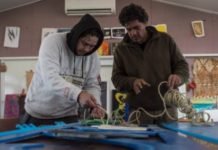Sunday FM: Music Therapy Comes to Life in Documentary
A new documentary coming to theatres around the US over the next few months explores Dan Cohen's Music and Memory program and its emotional...
Mad In America Film Festival In The News
Boston.com has published an article about the Mad In America Film Festival, running through this weekend in Medford, Massachusetts. "Making people rethink psychiatry —...
Webinar Discussion – Rethinking Madness
A free recording of last week's webinar anchored to Phil Borges' Crazywise, a documentary exploring alternative approaches to mental health, is now available. Over 4,000 people...
Mad Economy: Let’s Change the World!
Everyone in the world is either touched by their own mental health issues or have had a family member affected. What if they directed their buying power to an organization that would use the profits to fund exciting mental health & recovery projects both in the developing world and in their own countries; projects that would be ethical, non-coercive, personal recovery-based, and were aimed at creating recovery communities? What if they could buy products, crafts, services, art, music, books from people who had experienced mental health issues, enabling them to set up their own businesses or buy from social co-operatives that enabled distressed people to work and earn a living wage?
Hip Hop Therapy Psychiatrists Ask Media to Keep It Real
The Guardian and other media outlets ran articles about two psychiatrists promoting "the use of hip-hop as an aid to the treatment of mental...
Mental Health Digest February 2017
A new issue of the Mental Health Digest newsletter is now available. This issue includes an overview of art therapy as well as information about the impact...
It’s Easy to Get Caught Up in Constructing Our Selves
In this video for Aeon, clinical psychologist Daniel Brown discusses the ways that the construction of a fixed selfhood can limit the possibilities of our...
From Surviving to Thriving: Unleashing Creativity
There were days that I’d wake up and all I could do was cry for no particular reason, just another miserable day of withdrawal. However, the idea of taking photos would get me out of the house. Especially on those days, the absolutely only thing that would get me to move at all was the idea of taking photos. One particular day, I was just crying, crying, crying, and as soon as I got to a beautiful spot that I loved, I stopped crying, took photos, and felt at peace. I even found that the days I felt the worst were the days I took the best photos.
Re-telling Our Stories: Liberation or Re-oppression?
-When we "re-narrate" our own stories and identities, it may be an opportunity for either liberation or re-oppression.
Creatively Managing Voice-Hearing Through Spiritual Writing
I am a psychiatric survivor of over thirty-six years. Since my nervous breakdown in 1978, I have undergone multitudinous experiences ranging from the subtly humiliating to the horrifically debilitating at the hands of incompetent psychiatrists and psychopharmacologists who, in the name of medicine, did more harm than good.
The Art of Madness
In this piece for The Paris Review, Cody Delistraty details the French painter Jean Dubuffet's efforts to collect artwork made by people deemed mentally ill...
Why “Stabilizing” People is Entirely the Wrong Idea
If human beings were meant to be entirely stable entities, then “stabilizing” them would be an entirely good thing; a target for mental health treatment that all could agree on. But it’s way more complex than that: healthy humans are constantly moving and changing. They have a complex mix of stability and instability that is hard to pin down. All this relates to one of my favorite subjects, the intersection of creativity and madness.
Mental Well-Being and Engagement in the Arts
Public health researchers at the University of Western Australia examined the relationship between recreational arts engagement and mental well-being in the general population. The results, which have implications for policy makers as well as health practitioners, indicate that those who engage with the arts for two or more hours per week have significantly better mental well-being.
“’Yalom’s Cure’ is a Meditative Immersion into Leading a Psychologist’s Life”
The LA Times reviews a new film about Irvin David Yalom, existential psychologist, emeritus professor of psychiatry at Stanford Unversity. "’Yalom's Cure’ dispenses an...
Colleges Get Proactive in Addressing Depression on Campus
From The New York Times: The number of college students with mental health concerns is rapidly increasing, straining many universities' mental health and counseling centers. Colleges...
Thinking of Schizophrenia as Normal Can Be Helpful
Daniel Helman had a psychotic episode at age 20, but has been off all psychiatric medications since 2006 and is now 44. In Schizophrenia...
Creative Approach to Mental Health Underfunded
From Stuff: Ōtautahi Creative Spaces, a center that offers art therapy workshops, was recently set up in response to the earthquakes in Christchurch, New Zealand, where...
“Constructing the Modern Mind”
Psychiatrist and historian George Makari tries to illuminate the historical evolution of our understanding of the conscious mind and how it relates to the...
Twenty Years of Art at Bethlem Hospital
From BBC: At Bethlem Royal Hospital, a psychiatric hospital in London, patients are given the opportunity to work in the hospital's art studios as part...
“Veterans Let Slip the Masks of War: Can This Art Therapy Ease PTSD?”
“Service members suffering from PTSD often feel like they’re wearing a mask,” Samantha Allen writes in Invisible Wounds. Melissa Walker, an art therapist, asks them to make one. “The results are stirring. One mask, striped in red and black with hollow chrome-colored eyes, is wrapped in razor wire with a lock where its mouth should be.”
The Healing Power of Photographs
In this piece for Psychiatric Times, Dr. Harold J. Bursztajn reflects on the therapeutic value photographs had during the Holocaust and continue to have today.
"In...
“The 6 Blessings of Mental Illness”
-"I could not have written those six words 30 years ago, when panic episodes, anxiety disorders and Tourette's syndrome clouded my view," writes Jonathan Friesen.
Using Paint, Pen on Paper or Song to Revisit Trauma
From The Conversation: The literary, visual, and performing arts can play an important role in helping people process trauma, especially for those who have difficulty...
“Group Drumming Bangs Away at Anxiety and Depression”
“Prozac? Actually, percussion.” Researchers in the UK found that a ten-week drumming intervention significantly improved anxiety and depression for people seeking mental health treatment....
“Making Theater Autism-Friendly”
-The Atlantic reports on the growth of "autism-friendly" movie theaters, sports arenas and now live theaters.


















